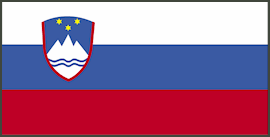Slovenia - Introduction
 Slovenia is situated at the crossroads of central Europe, the Mediterranean, and the Balkans. The Alps--including the Julian Alps, the Kamnik-Savinja Alps, the Karavanke chain, and the Pohorje Massif--dominate northern Slovenia near Austria. Slovenia's Adriatic coastline extends for approximately 48 kilometers (30 mi.) from Italy to Croatia. The term "karst"--a limestone region of underground rivers, sinkholes, and caves--originated in Slovenia's Karst plateau between Ljubljana and the Italian border. On the Pannonian plain to the east and northeast, toward the Croatian and Hungarian borders, the landscape is essentially flat. However, the majority of Slovenian terrain is hilly or mountainous, with around 90% of the surface 200 meters or more above sea level.
Slovenia is situated at the crossroads of central Europe, the Mediterranean, and the Balkans. The Alps--including the Julian Alps, the Kamnik-Savinja Alps, the Karavanke chain, and the Pohorje Massif--dominate northern Slovenia near Austria. Slovenia's Adriatic coastline extends for approximately 48 kilometers (30 mi.) from Italy to Croatia. The term "karst"--a limestone region of underground rivers, sinkholes, and caves--originated in Slovenia's Karst plateau between Ljubljana and the Italian border. On the Pannonian plain to the east and northeast, toward the Croatian and Hungarian borders, the landscape is essentially flat. However, the majority of Slovenian terrain is hilly or mountainous, with around 90% of the surface 200 meters or more above sea level.
A small transition economy with a population of slightly under 2 million, the United States considers Slovenia an important model of success and political stability for its neighbors in the former Yugoslavia. Strategically located at the "gateway" to the Balkans, Slovenia has been a star performer since its independence in 1991. It has registered dramatic gains in per capita and aggregate wealth, established a stable and well-functioning democracy, and raised the standard of living for Slovenes to a level on par with the smaller Western European economies. Slovenia is a parliamentary democracy and constitutional republic with a population of approximately two million. Power is shared between a directly elected president (head of state), a prime minister (head of government), and a bicameral parliament composed of the National Assembly (lower house) and the National Council (upper house). In September 2008 the country held free and fair multiparty parliamentary elections. Civilian authorities generally maintained effective control of the security forces.
The government generally respected the human rights of its citizens; however, there were problems in some areas. There were reports of trial delays and cursory procedures for review of asylum applications. Societal violence against women, trafficking in women and girls, discrimination against Roma, violence against gays and lesbians, and discrimination against former Yugoslav residents without legal status were also problems.
|
NEWSLETTER
|
| Join the GlobalSecurity.org mailing list |
|
|
|

